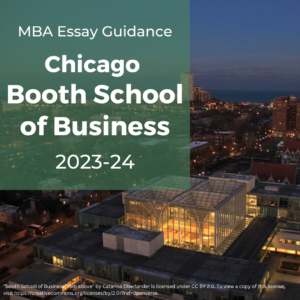Admitted to HBS & MIT Sloan Class of 2026
June 3, 2024
Read MoreJune 20, 2023
 Chicago Booth School of Business has released its MBA application deadlines and essay questions for the 2023-24 application cycle. Here are the important dates and Admitify’s guidance on the essays.
Chicago Booth School of Business has released its MBA application deadlines and essay questions for the 2023-24 application cycle. Here are the important dates and Admitify’s guidance on the essays.
All candidates are required to submit responses to the following two questions:
How will a Booth MBA help you achieve your immediate and long-term post-MBA career goals? (Minimum 250 words, no maximum.)
Essay 1 is a fairly standard Goals/Why MBA/Why Booth essay. Make sure each of these elements is discussed in detail. We think 500-700 words should be sufficient for Essay 1. Since your reasons for seeking a Booth MBA stem from your goals, start the essay with a fairly meaty statement of your goals: long-term goal (Plan A, Plan B), short-term goal (Plan A, Plan B). The Why Booth material could then follow directly or indirectly after. Indirectly?: Since Booth doesn’t limit you on wordcount, why not add a multi-para. section between the goals and Why Booth in which you show how your professional (and even pre-professional) experiences (read: accomplishments) have led you to this goal. This new section would enable you to explain the ‘why’ behind your goals and to share one or two key accomplishments that perhaps your recommenders won’t share. From this new section you could then segue into the Why Booth section with a short transition paragraph, ‘While my career has given me skills X and Y which my post-MBA skills require, it has not given me skills A and B which my post-MBA goals require. A Booth MBA ….”.
An MBA is as much about personal growth as it is about professional development. In addition to sharing your experience and goals in terms of career, we’d like to learn more about you outside of the office. Use this opportunity to tell us something about who you are… (Minimum 250 words, no maximum.)
For Essay 2, you can go up to 700-800 words if you must. This essay is similar to HBS’s ‘what else do you want us to know’ and Stanford’s ‘what matters most’: Booth wants to know who you are behind the resume through key ‘personal growth’ experiences – i.e., self-challenge, adversity, etc. So choose (this is the same advice we give for the HBS and GSB essays) 2-3 core, ‘defining-moment’ life experiences that changed you – helped you evolve as a person. These experiences can be professional, personal, academic or community/extracurricular. It doesn’t matter really, but they need to have been important to you perhaps because they left you a different person than they found you. So sharing how these experiences shaped you, in addition to the specifics of the experience, is important. If you have prepared a HBS essay or a Stanford A essay, either/both can be very relevant to and potentially re-purposed for this Booth essay (but be sure to delete the phrase ‘what matters most to me…’).
Is there a common thread (perhaps involving striving toward personal freedom, ‘finding’ yourself, overcoming some setback, doing the right thing etc.) that unites these three very different experiences? It’s not essential that the experiences add up to some big insight about your life, but if so sharing that common thread can make the essay stronger.
This guidance is not meant to be a formula: start by answering this question sincerely — what have been my life’s 3 biggest ‘personal growth’ experiences? Extra points if these experiences that changed the trajectory of your life on a fundamental level; extra points if any of these experiences has an ethical/moral component. Note that I suggest only 3 (maybe 4) growth experiences because (a) you really need to unpack your thinking in explaining why the growth examples you share were so pivotal in your development (i.e., we need extended examples) and (b) an essay longer than 750-800 words may get on the committee’s nerves. In many cases the growth experiences the essay should be built around will be obvious from the story you shared in our Admitify questionnaire or brainstorming calls.
Is there any unclear information in your application that needs further explanation? (Maximum 300 words.)
There are two ways to approach this optional essay: you can either do damage control — if you need to — on extenuating circumstances, or you can provide additive content (see below). You can also try to do both as long as you meet the word limit.